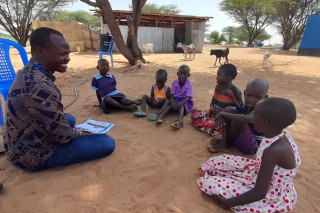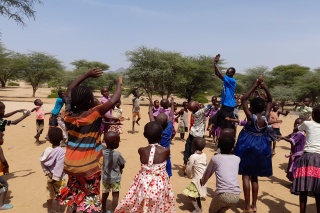
Unlocking potential: school feeding in pre-school paves the way to a brighter future
New research from Mary’s Meals highlights the profound impact of school feeding in early childhood education
Food insecurity in Zambia and Kenya is extremely high. In Zambia, natural disasters, unpredictable weather and Covid-19 have added significant strain to the country’s economy, leaving poor households struggling to access healthy and nutritious food. In Kenya, malnutrition among children is widespread in both rural and urban areas. The country’s food production is suffering because of failed rains, leaving families struggling to put meals on the table. The global hunger crisis, driven by conflict, climatic events, the Covid-19 pandemic and rising costs, is exacerbating ongoing issues facing the people of Kenya and Zambia – people are hungrier than ever – and as the cost of living soars, so too does the challenge of sourcing food.
Mary’s Meals recently carried out research to examine the impact of school feeding on Early Childhood Education (ECE) in both Kenya and Zambia where levels of food insecurity are very high. Here’s what we found.
School meals relieve hunger in ECE centres
To determine what impact Mary’s Meals has on hunger levels throughout the day, the children were each asked to fill up a mug with sand to show how empty or full their tummies were at three key times – when they first arrived at school, before break time and going home. Many of the children (64.3%) said their tummies were empty early in the morning. Later, before break time, the percentage of children with empty stomachs rose even higher to 89.6%. Feelings of hunger were much less prevalent at the end of the school day, with many (86.3%) saying they felt full as they left to go home. This is a stark comparison to the 4.4% who said they were full first thing in the morning.
The lack of sufficient food at home for families in Kenya and Zambia was also evident, especially in Turkana (semi-arid region in northwest Kenya), where food insecurity levels are critically high. We found that for half of the total children interviewed – the majority of whom live in Turkana – the daily meal at school is the only meal they will eat in a day. When children don’t receive school meals, only 2.9% say they have enough to eat and 85.2% are hungry.
Headteachers in both Zambia and Kenya echoed the hardships facing children in their communities. Every headteacher interviewed attested to children arriving at the centres hungry at least once a week, and almost a third (30.43%) said it was a daily occurrence. In Kenya, 100% of headteachers said they don’t think children have breakfast at home before attending class.
Meals bring happiness
Satisfying hunger with a daily meal has a significant impact on the happiness of pre-school children. Children were shown a diagram with a happy, sad and indifferent faces to illustrate how hunger at school made them feel. The overwhelming majority of children (84.72%) said they feel unhappy when they are hungry. When asked what school meals mean to them, happiness was the overarching feeling expressed, as well as energy, strength and concentration.
Communities appreciate the value of early education
The influence of school feeding in ECE centres not only has a positive impact on the children and schools but also on the wider community. More than three-quarters of households (76.61%) said there are significant advantages to pre-school children receiving regular meals at ECE centres. These include reduced financial burden for the household; lower levels of hunger among children and in the community; children being motivated to attend school; increased value placed on education by communities; and reduced stress and worry about hunger within communities.
Responses from households cemented the positive role early childhood education plays in preparing pre-school children for primary school. Almost all households interviewed (99.49%) supported this, saying attendance at school is an important step for young children’s progression. More than a quarter (26.19%) of households felt that the classes give children a head start in education.



